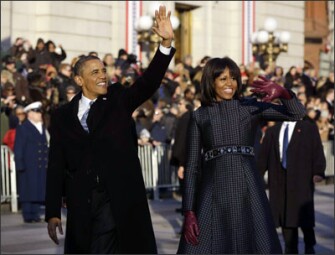
Washington, D.C.
President Barack Obama, who was officially sworn in today for his second term as the nation’s 44th president, put training more math and science teachers and taking big steps to boost school safety high on his second-term wish list.
Inaugural addresses are rarely heavy policy speeches, so including these two K-12 initiatives sends an important signal about the priority the president places on preventing another massacre like the one in Newtown, Conn., last month.
“Our journey is not complete until all our children, from the streets of Detroit to the hills of Appalachia to the quiet lanes of Newtown, know that they are cared for and cherished and always safe from harm,” Obama told a packed crowd of freezing supporters spreading out from the Capitol Grounds.
Obama’s pledge on school safety comes less than a week after his administration released a lengthy list of policy prescriptions to prevent further gun violence. They include new money for states to put safety plans in place, and a major focus on beefing up mental health services, including training teachers to recognize the signs of mental illness and get students the help they need.
New funding to train math and science teachers has been on Obama’s to-do list for a while—it was one of the few K-12 policies that the president cited when he accepted his party’s nomination for president.
“No single person can train all the math and science teachers we’ll need to equip our children for the future,” Obama said. It’s unclear, however, where the administration will get funding for a new teacher training program.
Some teachers who attended the inauguration said they continue to stand by Obama, even as they have qualms about some of his K-12 policies.
Ken Cowgill, who teachers government and history at Frankfort High School in Ridgeley, W.Va., said he likes Obama—but he doesn’t have warm feelings about the Race to the Top competition, Obama’s signature K-12 policy.
“I’m not a real big fan of pitting school systems against each other,” he said.
Amy Vandersall, who teaches government at Exeter High School in New Hampshire, first met Obama at a house party in her home state, when he was running for his first term. At first, she said, she thought he was too inexperienced to be president. But once she listened to his ideas and his explanation of the country’s problems, she was sold.
Four years later, she’s happy with Obama overall, but she wishes he hadn’t cut funding for the Center for Civic Education, a non-profit organization that sponsored the We the People program, which was aimed at getting students engaged with the U.S. Constitution. She got some of her best materials from the center, she said.
“Whatever you cut is valuable to somebody,” she said.
But Kia Henley, an assistant principal at Alcova Elementary School, Gwinnett County, Ga. gave Obama a thumbs-up for giving her state the chance to “revise” the No Child Left Behind Act through a waiver, which allowed her school to move toward a new teacher evaluation and the Common Core State Standards.
Her wish list for the next term? Increased federal funding, and “more pay for teachers,” she said.
Photo: President Barack Obama and first lady Michelle Obama wave to the crowd as they walk down Pennsylvania Avenue near the White House during the 57th Presidential Inauguration parade on Monday in Washington. —Charles Dharapak/AP



